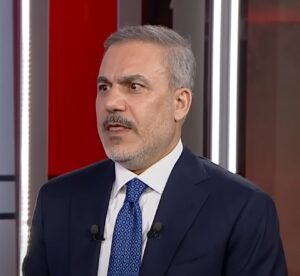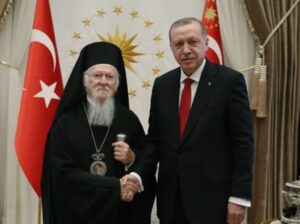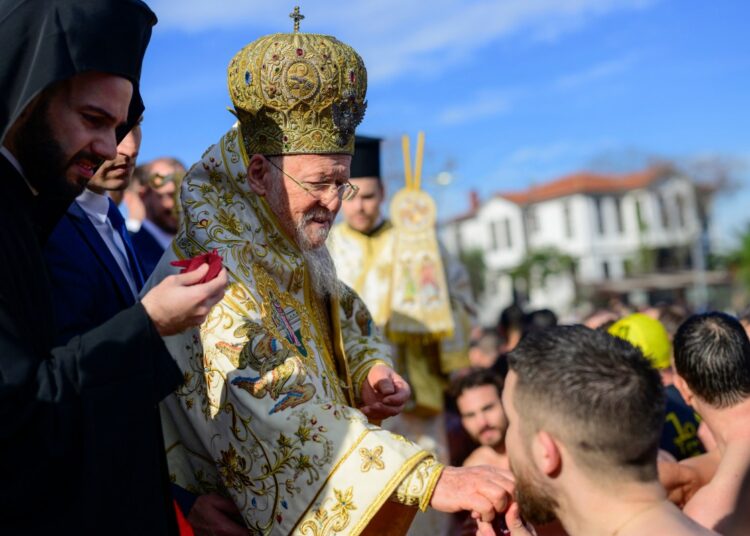Abdullah Bozkurt/Stockholm
Turkey continues to deny the ecumenical status of the leader of some 300 million Orthodox Christians worldwide by refusing to acknowledge the Ecumenical Patriarchate of Constantinople in Istanbul, according to a recent letter by Turkey’s former intelligence chief-turned-top diplomat.
The letter, obtained by Nordic Monitor, informed lawmakers in the Turkish Parliament in July that the Ecumenical Patriarchate of Constantinople holds no special legal or international status beyond its limited role as the spiritual leader of the Greek Orthodox minority in Turkey.
Written by Turkish Foreign Minister Hakan Fidan, who served as the country’s intelligence chief for a decade before his appointment as foreign minister in 2023, the letter made clear that the ecumenical title used by the patriarchate carries no legal or political meaning under Turkish or international law, framing it instead as an internal theological designation within the Orthodox Christian world.
Citing historical records, Fidan wrote that the 1923 Treaty of Lausanne, which laid the foundations of the modern Turkish Republic, contains no provisions regarding the status of the patriarchate. Instead, he referred to the proceedings of the Lausanne Peace Conference of January 10, 1923, where it was agreed that the patriarchate would no longer deal with political or administrative matters but would limit itself strictly to religious affairs.
“The title ‘ecumenical,’ meaning universal, is a concept concerning the spiritual relations between an institution representing a recognized faith system and its believers,” Fidan stated. “In other words, it is an internal matter of the Orthodox world and theology. In this context, the ecumenical character, as a spiritual title in relations with other Orthodox churches, pertains to Christian theology and studies and does not entail any rights or privileges in our country or internationally,” he added.
Fidan underlined that the ecumenical patriarch, Bartholomew I, occasionally attends international meetings, some of them with Turkey’s participation, but stressed that in these contexts his interventions are confined to “spiritual matters.” He further noted that in Turkey, the patriarch does not use the “ecumenical” title in official correspondence or contacts with state authorities.
The minister added that Ankara itself does not employ the designation in dealings with the patriarchate and has no obligation to do so, citing a 2010 opinion by the Council of Europe’s Venice Commission, which he argued confirmed that Turkey is not legally bound to recognize the title.
The patriarchate, based in the Fener (Phanar) district of Istanbul, is internationally recognized as the “first among equals” in the Orthodox Christian world, holding spiritual primacy over some 300 million believers globally. For centuries, it has used the title “Ecumenical Patriarch,” a designation first adopted during the Byzantine era.
Turkey, however, rejects this ecumenical status, insisting that under the Lausanne framework, the patriarchate’s role is confined to serving the religious needs of the small Greek Orthodox minority in the country. Nationalist circles in Turkey often argue that recognizing the patriarchate as “ecumenical” could open the door to demands for political privileges or international standing comparable to that of the Vatican.
Both the Islamist government of President Recep Tayyip Erdogan and his far-right nationalist ally, the Nationalist Movement Party (MHP), as well as large sections of the opposition, share the same stance in denying this status. They often portray the patriarchate’s activities as suspicious or even subversive, alleging without evidence that they undermine the foundations of the Turkish Republic.

Although the Turkish foreign minister sought to justify this position by referring to the Venice Commission’s 2010 opinion, a careful reading of that document offers a very different conclusion. While the commission refrained from making theological judgments, it emphasized that the right of the Orthodox Church to use its own titles, including “ecumenical,” is part of religious freedom and institutional autonomy under Article 9 of the European Convention on Human Rights (ECHR), a treaty that is binding on Turkey.
The opinion explicitly stated that the patriarchate must be free to use the ecumenical designation. It also criticized the 2007 Turkish Supreme Court of Appeals ruling that declared the ecumenical title had “no legal basis” in Turkey, calling it an inappropriate intrusion into religious autonomy. The commission noted that secular courts are not competent to decide theological questions.
The Venice Commission further rejected Turkey’s reliance on the Treaty of Lausanne to deny the ecumenical title, pointing out that the treaty is silent on the matter and contains no prohibition against its use. It added that preventing or obstructing the patriarchate’s use of its traditional title would be difficult to justify under ECHR standards as it would fail the test of proportionality.
By omitting these points, Fidan presented a distorted picture of the Venice Commission’s stance, suggesting endorsement of Turkey’s restrictive approach when, in fact, the commission criticized precisely the type of interference that Turkey practices.

Fidan’s letter reflects Turkey’s determination to hold the line on this issue amid renewed international scrutiny and makes clear that the Turkish state remains plagued by deep-seated fears that recognizing the patriarchate’s ecumenical role could open the door to international privileges comparable to those of the Vatican.
In recent years the Ecumenical Patriarchate has played a leading role in Orthodox Christian affairs, most prominently in granting autocephaly, or independence, to the Ukrainian Orthodox Church, a move fiercely opposed by Moscow. That decision infuriated Erdogan’s neo-nationalist allies known as Ulusalcılar, a group often aligned with Russia, Iran and China against the West.
Western governments and the European Union have repeatedly urged Turkey to recognize the patriarchate’s ecumenical status and to reopen the Halki Seminary, which was closed by Turkish authorities in 1971 to prevent the training of Orthodox clergy. Last month US President Donald Trump reportedly raised the issue in talks with Erdogan at the White House after the Greek Orthodox Church brought up the matter following Patriarch Bartholomew’s earlier meeting with Trump.
“We are ready to do whatever is incumbent upon us regarding the Heybeliada school,” Erdogan told Trump during the meeting. “I will have the opportunity to discuss this matter with [Patriarch] Bartholomew upon my return.”
The Erdogan government has entertained similar possibilities in the past but failed to deliver on promises made to the Christian minority in Turkey. The patriarchate still lacks legal personality, forcing it to operate through foundations subject to state oversight.
By selectively invoking the Venice Commission, Ankara seeks to bolster its legal justification, highlighting only the commission’s acknowledgment that Turkey itself has no obligation to use the title. Yet critics note that the same opinion also emphasized the patriarchate’s right to self-designation and warned against state interference, points conspicuously absent from Fidan’s letter.
For the patriarchate, the dispute underscores the fragile balance it must continue to maintain, as it has done for decades: asserting its ecumenical role in global Orthodoxy while carefully navigating Turkey’s restrictive domestic framework.












